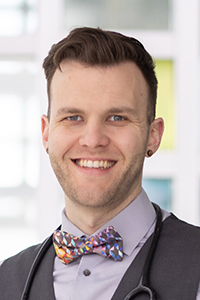
Dr. Taran J. Main is the 2022–23 UBC Alumni Builder Award – Southern Medical Program Recipient.
Dr. Main (he/him) is an addictions medicine specialist and family physician in the Okanagan and a dedicated alumnus of the Southern Medical Program and clinical instructor. He devotes his career and spare time to advocating for those experiencing homelessness, substance use, and mental illness, and he helps patients make connections within the community.
What drew you to the MD program at UBC?
I grew up in BC and wanted to stay local, so I was excited to be a part of either Victoria IMP or the Kelowna SMP program for my medical training and I am so grateful I was accepted into the Southern Medical Program in Kelowna where I now live and practice.
What is your favorite memory from your time at UBC?
My favourite memory at UBC-O was honestly just sitting in the lunch area on campus laughing with my colleagues alongside the SMP physician and admin staff and joining in the fun. These special moments show how intimate and connected the program at SMP was and still is.
What has been your journey since graduating from the MD program at UBC?
Since graduating from the SMP, I completed my family medicine residency at the Kelowna rural program and then my enhanced skills in Addictions Medicine in Kelowna and Victoria. I am now working as part of the Addiction Medicine Consult Service at Kelowna General Hospital and in the community as an addictions provider. I also locum as a family physician.
Since your graduation, tell us about your connection with the SMP community.
I have always enjoyed teaching and wanted to integrate it into my career as soon as possible. I wanted to get connected with SMP to contribute to this incredible program. I have been thrilled to have students join our service at the hospital as well as facilitate sessions at the campus around physician burnout, mindfulness, and academic sessions.
Why are you inspired to give back to your communities?
I had some incredible mentors/preceptors in the SMP and my family practice program that had a very big impact on my medical training and were a big part of my passion for addiction medicine. I feel pulled to give back to Kelowna and hopefully inspire and leave lasting impressions on the next generation of medical students as my mentors did for me.
What advice would you give to alumni who want to get more involved with UBC?
Do it! Reflect on what you are interested in or how you would want to contribute and there are great opportunities to get involved or, from my experience, they will create opportunities if there is a need/interest.
How has your identity affected your perspective in your practice, community involvement, and/or your future pursuits?
My identity and who I am have greatly influenced who I am as a physician, colleague, husband, father, and friend. It influences what I prioritize in my practice, my schedule, my time at home, how I want to be remembered, how I want to be seen, where and who I make a stand against or with, where I look to make change, how I choose to interact with patients and who I choose to trust and associate myself with in this profession.
What is one thing you hope to accomplish in the next 10 years?
Increase medical student awareness and knowledge of trauma-informed care for patients with substance use disorders.
What does a healthy society mean to you?
That is a big question. The short answer, I think a healthy society is one that is present.
The long answer, I find that this is incredibly hard to achieve and something that I work hard to attempt to do daily. So many people are swept away in the busyness of life while all the important things pass them by as it insidiously impacts the individual’s mental, physical, emotional, and spiritual well-being. The ripple effect of being present can be so profound. From appreciating your walk to work and the robin who made a nest in the tree by your house, vs looking at your phone; to being present with your patient instead of worrying about how behind you are in the clinic; appreciating the food available at the grocery store and what you could make with it that night, and how I can include my family in the kitchen with music and laughter and quality time, instead of scarfing down the take out with the TV on in the background; to appreciating the little moments in your life like my daughter and cat having a special moment on the couch as the sun sets behind them instead of scrolling through social media on my phone; to taking a pause in your busy to-do list for the day to sit on a bench with stranger who is grieving. Working in palliative care, I have never heard anyone say they wished they worked more, spent more time on their phone, wished they had more money or wished they had done more with their careers. Every single person wished they poured more time into their friends, their spouse, their kids and the ventures and hobbies they enjoyed.
Not only will being present benefit you as an individual but to those around you. To be present to your emotions and needs, gives you the space and time to develop the skills to work through your own hurt, personal trauma and everything in between. This then, allows you to be present for your children and all of their needs, who in turn would be present for themselves and their children. This would combat and reduce the impact of intergenerational trauma, reduce the growing number of individuals turning to substances to cope through so much hurt and pain. If we are to slow the tide that is the opioid crisis, or the insidious and overwhelming alcohol consumption so normalized by society and many other substances we need to change. This is only one piece of the 1000 piece puzzle, but to be present is to be aware of yourself and everything around you, and to be aware allows you to take first steps to making change towards a healthier you and a healthier society.
Take the time to be present, as time is our most precious resource, every single moment in life has value if you take the time to appreciate it.
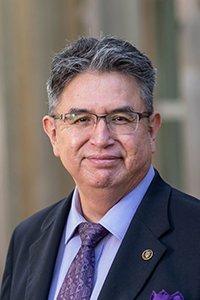
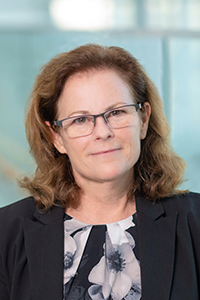
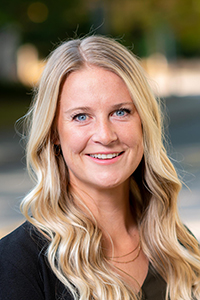 Rachel Ramsden (she/her) is a PhD Candidate at the School of Population and Public Health at UBC and a Research Coordinator at the Play Outside UBC Lab. Rachel completed a Bachelor of Kinesiology (2013) and a Master of Public Health (2016) at UBC before pursuing her doctoral studies in 2019. Rachel’s PhD research examines the design of outdoor environments and how they support young children’s outdoor play. She is also a UBC Public Scholar and invested in ensuring children’s perspectives are sought in research through innovative methodologies. Rachel grew up in Richmond, BC, and enjoys regularly connecting with the outdoors by running on the local trails with her dog and playing on her community soccer team. Through her research, Rachel hopes to mobilize academic findings into policies and community planning standards that enhance children’s outdoor play opportunities across communities in BC.
Rachel Ramsden (she/her) is a PhD Candidate at the School of Population and Public Health at UBC and a Research Coordinator at the Play Outside UBC Lab. Rachel completed a Bachelor of Kinesiology (2013) and a Master of Public Health (2016) at UBC before pursuing her doctoral studies in 2019. Rachel’s PhD research examines the design of outdoor environments and how they support young children’s outdoor play. She is also a UBC Public Scholar and invested in ensuring children’s perspectives are sought in research through innovative methodologies. Rachel grew up in Richmond, BC, and enjoys regularly connecting with the outdoors by running on the local trails with her dog and playing on her community soccer team. Through her research, Rachel hopes to mobilize academic findings into policies and community planning standards that enhance children’s outdoor play opportunities across communities in BC.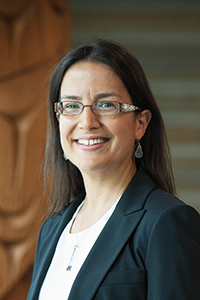
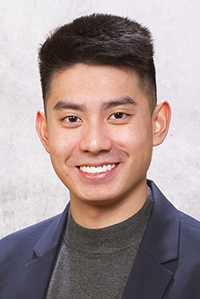 William Yip is the 2022–23 UBC Alumni Builder Award – Faculty of Medicine Recipient.
William Yip is the 2022–23 UBC Alumni Builder Award – Faculty of Medicine Recipient. 
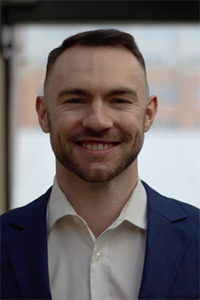 Harrison Kettyls (he/him) is a recent graduate of the Master of Physical Therapy program at UBC. He grew up in Victoria BC and completed his Bachelor of Science in Kinesiology at the University of Victoria prior to starting the MPT program. As the Physical Therapy Student Society President, he represented the MPT program within the Faculty of Medicine and aided in advocating for students. Harrison loves being active and can find him outdoors playing soccer, hiking, camping, surfing, and snowboarding. He also enjoys photography and playing his guitar. He looks forward to starting his physiotherapy career in Vancouver and helping people in the community get back to the things they love to do.
Harrison Kettyls (he/him) is a recent graduate of the Master of Physical Therapy program at UBC. He grew up in Victoria BC and completed his Bachelor of Science in Kinesiology at the University of Victoria prior to starting the MPT program. As the Physical Therapy Student Society President, he represented the MPT program within the Faculty of Medicine and aided in advocating for students. Harrison loves being active and can find him outdoors playing soccer, hiking, camping, surfing, and snowboarding. He also enjoys photography and playing his guitar. He looks forward to starting his physiotherapy career in Vancouver and helping people in the community get back to the things they love to do.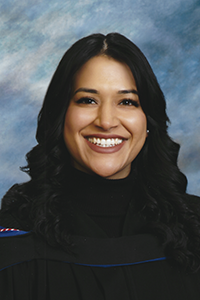 Katrina Moorthy (she/her) is a recent graduate of the Masters of Occupational Therapy program at UBC. During her time at UBC, Katrina was fortunate to represent her class as the Co-President of the Occupational Therapy Student Society and the Year 2 representative on the Justice, Equity, Diversity, and Inclusion (J.E.D.I) committee. She was also honoured to represent her program at both the 2022 CAOT Conference and the TLEF and ALT-2040 Conference.
Katrina Moorthy (she/her) is a recent graduate of the Masters of Occupational Therapy program at UBC. During her time at UBC, Katrina was fortunate to represent her class as the Co-President of the Occupational Therapy Student Society and the Year 2 representative on the Justice, Equity, Diversity, and Inclusion (J.E.D.I) committee. She was also honoured to represent her program at both the 2022 CAOT Conference and the TLEF and ALT-2040 Conference.